About 15 students and one alumnus gathered Friday outside the chapel at Cornerstone University in Grand Rapids, Michigan, to protest the inauguration of Cornerstone President Gerson Moreno-Riaño.
The student-led demonstration is the third protest this week concerning Moreno-Riaño, a Colombian-born immigrant who was hired in May to replace retiring president, Joseph Stowell.
On Thursday, Cornerstone’s faculty voted no confidence in Moreno-Riaño. Earlier in the week, 299 alumni submitted a letter to the board, accusing Moreno-Riaño of reversing progress the university had made regarding diversity, equity, and inclusion (DEI).
Drew Parker, a recent alumnus and one of the organizers of the protest, said the student protesters didn’t feel like they knew what was going on at the university and called for transparency and inclusivity. The students also urged for a return of several faculty and staff who advocated for DEI and disappeared during Moreno-Riaño’s first four months in office.
Parker said he and others wanted to protest peacefully and respectfully and in a way that loves even those with whom they disagree.
Your tax-deductible gift helps our journalists report the truth and hold Christian leaders and organizations accountable. Give a gift of $30 or more to The Roys Report this month, and you will receive a copy of “Hurt and Healed by the Church” by Ryan George. To donate, click here.
The group of protestors held signs that read: “Education with Representation”; “We love our school but still need changes”; “Students need to be included in decisions regarding us students”; “a President for the People”; “We demand transparency and inclusivity”; and “DEI unifies.”
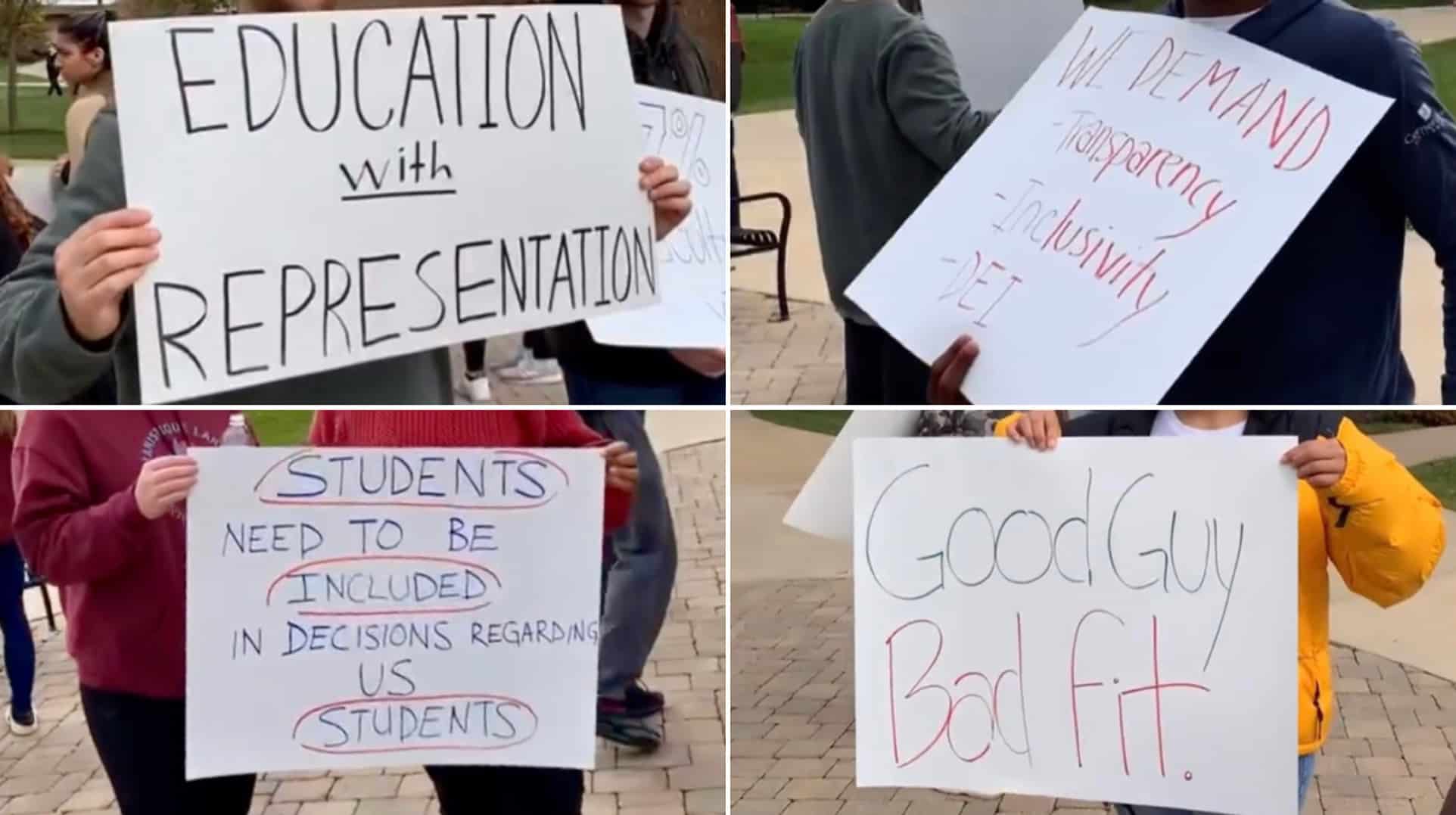
Meanwhile, the inauguration proceeded as planned. And even though he recently resigned from his role assisting with fundraising a couple weeks ago, former president Joe Stowell participated in the program.
Stowell prayed the Lord would equip students “to love mercy, do justice, and to walk humbly with the Lord.” And he prayed for the board, faculty, staff, and administration for the “transforming presence” of God in their responsibilities.
The event was livestreamed but experienced an apparent technical issue when Moreno-Riaño took the microphone. There was no audio for the first minutes of Moreno-Riaño’s speech. All the other speakers were broadcast without issue.
Nationally known conservative speaker and author Peter Wood was a no-show at the inauguration. Former Heritage Foundation president Kay Coles James appeared only at a private Thursday evening event rather than the Friday inauguration service.
Instead, local community leaders and pastors, a few of whom are minorities spoke. They welcomed the new president, asking for the university to welcome him, too.
“Be there for him, support him,” said Bill Pink, the African American president of Grand Rapids Community College. “He doesn’t mind being challenged. He doesn’t mind questions. He will need your support. He will need your encouragement.”
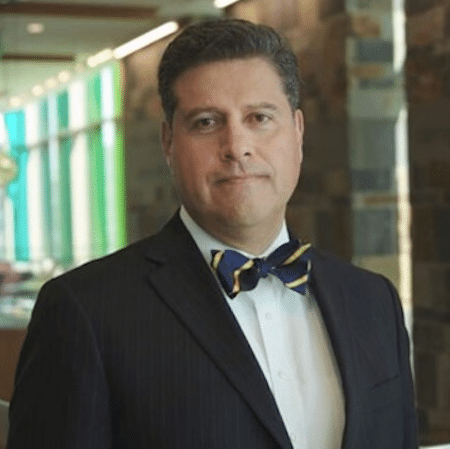
No mention was made of the faculty’s vote of no-confidence at the inauguration nor the protest. But Carole Bos, board chairman, said in her speech that the search committee was unanimous in supporting Moreno-Riaño as the university’s next president.
“Know this, at every turn, we were committed to the Lord’s will,” she said.
She added that while transitions are hard, the university’s leaders would not move forward “in a spirit of fear.”
“It’s not easy to live in America right now,” she said. “I hope they see us with one voice, unified, praising the One who created us.”
Moreno-Riaño spoke on Moses and said that God uses imperfect people to accomplish his purposes for the sake of his glory.
“It’s amazing to consider the fact that our Great Lord chooses to accomplish His great purpose on earth through the lives of fallen, sinful, fragile and imperfect people,” he said.
Concerns about alleged ‘social justice agenda’
The recent conflict is the result of several years of turmoil at the school due to diversity and social justice initiatives begun under Stowell. While many celebrated the initiatives, others felt they went too far.
Cornerstone University has increasingly adopted a “social justice agenda,” said Deborah Hirschhorn, a student who transferred out of Cornerstone last year.
Hirschhorn said staff and students were encouraged to read “White Fragility,” a book on racism by Robin DiAngelo, a professor of multicultural education at Westfield State University. Conservative students felt like they couldn’t express their opinions, and the director of diversity would walk around campus wearing a Malcolm X hat, she said.
The “straw that broke the camel’s back,” said Hirschhorn’s mother, Lisa, was a Jan. 27, 2020, chapel address by Michelle Higgins, an advocate for Black Lives Matter.
In response, Ryan Hoogerheide, a student resident assistant, crafted a letter, arguing that chapel services no longer “centered on the Word of God.”
Hoogerheide shared his letter with six people, but the letter quickly spread to 150 people and 40 signed it, he said at a university meeting in February 2020. A recording of the meeting was given to The Roys Report.
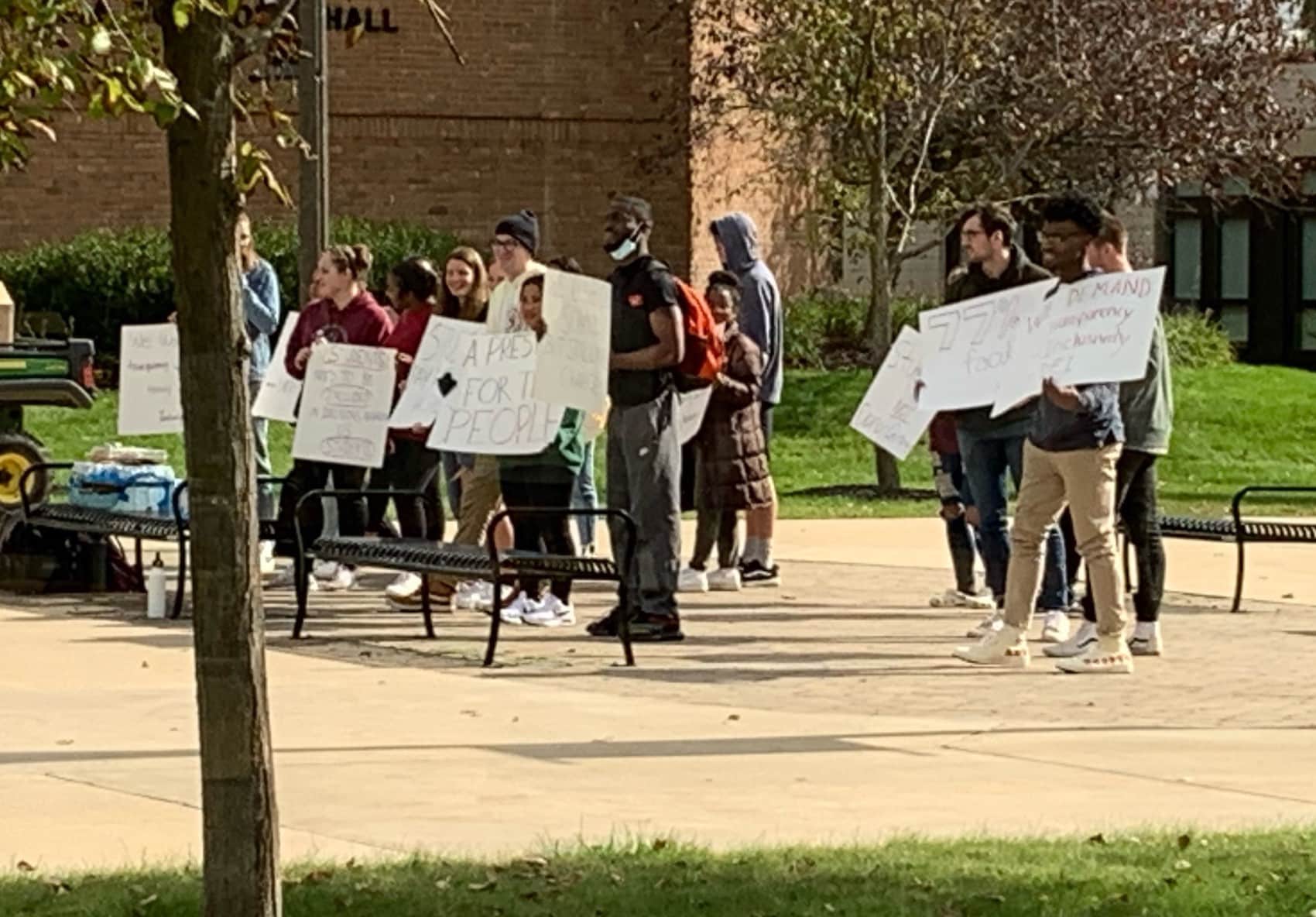
Soon after, the university held a town-hall meeting, attended by students, faculty, staff, and parents. At that meeting, Hoogerheide apologized for the hurt the letter caused, and encouraged students to listen to other perspectives and study the issues.
Susan Burner, the director of campus ministries at the time, said at the meeting that students wouldn’t be given an opportunity to publicly discuss the issues at the town hall, but could do so at follow-up meetings. She urged a time of learning. But the university had to close for COVID soon after the town hall meeting.
According to Diana Whan, whose son attends Cornerstone, the town hall meeting failed to alleviate the concerns of some parents and students.
“You started seeing arguments and disagreements happening,” she said. “And it kind of broke up that camaraderie, that culture of acceptance.”
Shift under Moreno-Riaño
When Moreno-Riaño was hired, the school shifted away from its prior focus on social justice and equity, the alumni letter submitted this week alleges.
In the past four months, eight faculty or staff involved in DEI initiatives suddenly left Cornerstone, including two vice presidents, the director of diversity, two professors, a director of campus ministries, the campus pastor and an associate dean. These were the employees who collectively spent “decades” working towards inclusivity, the alumni letter states.
Bob Sack, Cornerstone’s vice president for advancement, would not comment on whether the employees were fired or resigned.
“We are troubled by news which suggests that Cornerstone, under the new presidency of Dr. Gerson Moreno-Riaño, is headed in a direction which goes against our stated mission statement,” the signers wrote.
The departure of the faculty and staff has driven students of color to seek support outside the university, the alumni letter states.
Cornerstone, however, has recently hired a new diversity director, its website states, and plans to hire a chief diversity officer.
Despite current disagreements on how things have been handled in the past, Parker insisted the conversation over diversity doesn’t have to be contentious. Instead, he said protesters said they hope to be a part of respectful dialogue.
“We want to exemplify Christ on this endeavor,” he said. “We want to love one another with our actions.”
This article has been updated to accurately reflect the participation of speakers at inauguration events.
 Rebecca Hopkins is a journalist based in Colorado.
Rebecca Hopkins is a journalist based in Colorado.




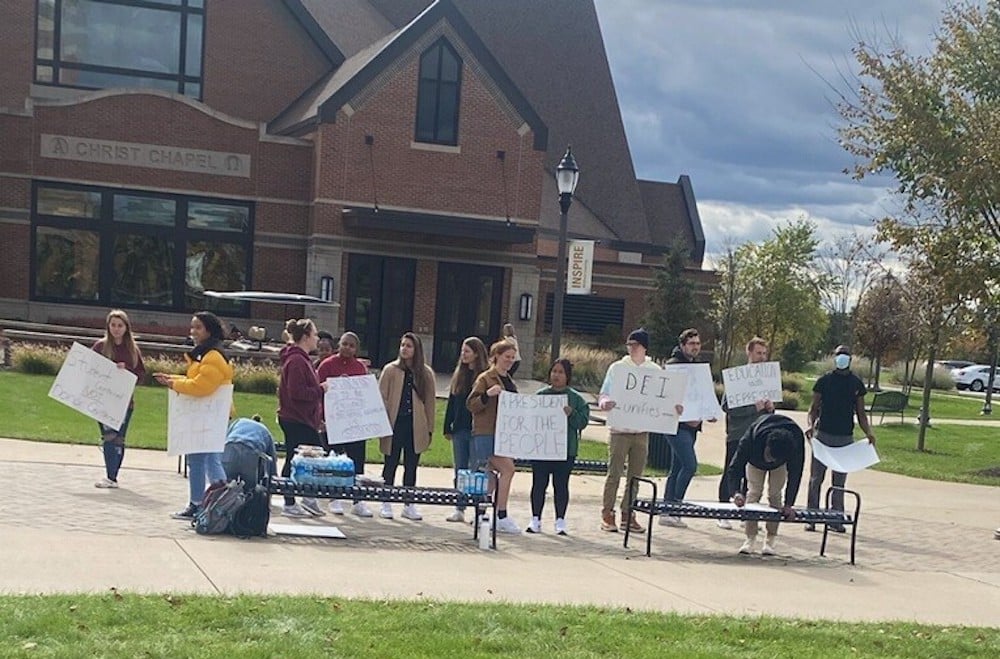
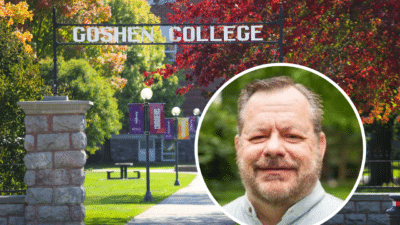
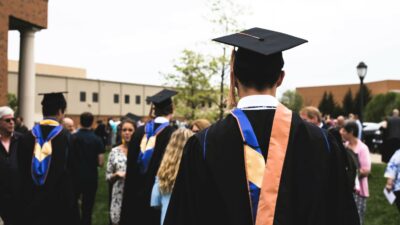
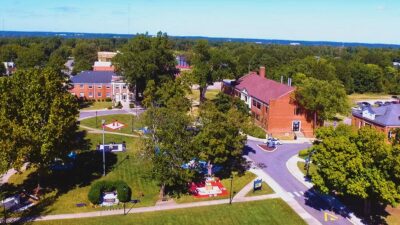

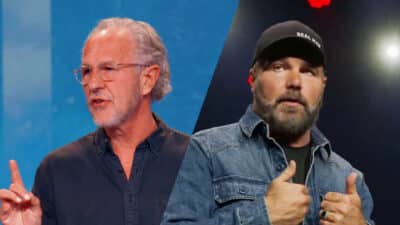
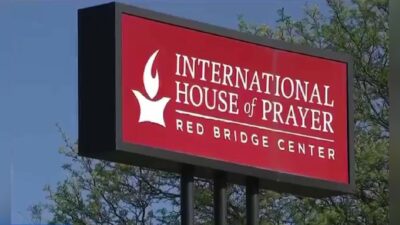
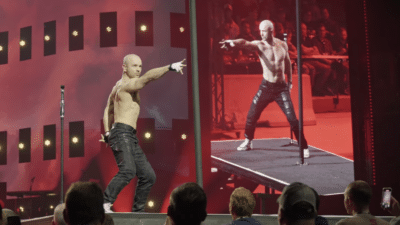

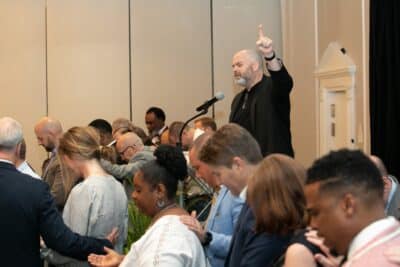






37 Responses
Sound like they’re going in a better direction now. Those poor people required to read “white fragility”. Yikes
Sara, surely it would not hurt them to be exposed to opposing ideas.
Surely the opposing idea the serpent had on eating from the tree of knowledge/life would not cause harm.
Andrew, what are you and others so afraid of? If they believe the Bible they know the truth. Surely their faith is not that fragile.
My point: Adam and Eve lived in God’s garden, were deceived by a new idea, regardless of what God had said to them.
You responded with questioning my fear level and how strong my faith in the Bible is, not the point of some ideas can cause harm regardless of how close someone is to God.
That is deflection.
While you my not care for your fellow Christians, I am concerned when propaganda/gaslighting/DARVO/shame tactics are being used against them in order to keep them from having an opinion or asking questions.
As for the “others” you mentioned, I do not know them or speak for them.
Yes, their faith is that fragile. We’re seeing churches and denominations split over the anti-racist movement, social justice, equality, equity, and CRT. This movement is driven by a new religion that is a toxic mixture of expressive individualism and anti-racism. This sinister religion preys upon values a vast majority of us hold dearly: we all want people to be loved for who they are and equally valued. Then, the anti-racist movement uses a commonly held belief as a Trojan horse to dismantle society from within once it is bought into. Anti-racism is a tidal wave that is crashing into the church and it is sweeping away many well-intentioned, thoughtful people who do not truly understand what it is.
Exposure to new ideas is not the goal of the anti-racist. They don’t care if you understand them. In fact, they believe you cannot understand if you are white…only people with a variety of oppressed identities qualify to march alongside the anti-racists. It is an ideology that is particularly dangerous as it corrupts what is central to the message of Jesus under the guise of justice.
I believe there are a lot of assumptions here that are leading to a breakdown in constructive dialogue. I support the concept of anti-racism when it comes to being intentional about addressing and confronting racism. I believe many of the movements in our history (civil rights, suffrage, abolitionist, etc) would have not been necessary if people had been intentional about addressing and confronting racism (and sexism) when they saw it. To be passive is to undervalue, deny or outright ignore the impact of marginalizing another person based on a God-given identity (race, gender).
Now, I don’t think anyone can fully understand what it’s like to be another person’s race or gender. I am Black and cannot fully understand what it’s like to be white. So when a white person is sharing their experience, I LISTEN. I don’t try to justify, downplay or deny their experience or how it made them felt. When I’ve had conversations with anti-racists, that is what they are upset about. And I get it because I’ve had it happen to me: I’m sharing my experience as a Black woman, and a white person jumps in and says “that’s not how you really felt…” or “that’s not what was intended so you shouldn’t feel hurt”. That is NOT ok.
I hope that sheds better light.
DiAngelo’s book doesn’t contain ideas. It is an opinionated rant that has no basis in any scientific research of any credibility.
As usual, Julie is on the side of the cancel mob…
I’m not on either “side.” We reported the news, and included a diversity of perspectives on the issue. That’s our job.
At least this article gave a bit more information than the Washington Post article, which came across biased. However, I would have appreciated hearing quotes from both sides.
My daughter attends Cornerstone and is bothered by how political it is. She expected better. Why are they copying the World? Why did they need to hire ANOTHER diversity director? Getting rid of the first one was a step in the right direction. And do they really need another chief diversity officer? Whatever happened to being good stewards? Considering most universities are adrift in a sea of Diversity, Equity, and Inclusion these days, Christians could really stand out by not copying the secular colleges.
Unfortunately, Christian colleges are
among the least diverse (overwhelmingly white). There are several books written by Black and Latino alumna of evangelical schools on how isolating their experiences were, despite the best of intentions of the faculty, staff and students. (I recommend “Reconciliation Blues”, as that’s a fave of mine). Perhaps we (or a chief diversity officer) needs to examine and address why that is. We should be leading in being inclusive, not woefully behind in even getting people of all races into our doors.
Marin Heiskell,
You seem to be saying MORE racial polarization is the answer. Can you try reconciling that with Scripture?
That’s not what I’m saying at all. How did you get that out of “We should be leading in being inclusive, not woefully behind in even getting people of all races into our doors”?
Like it or not Christian colleges and churches are among the most racially segregated. I believe this should be examined and addressed – perhaps by a CDO or other professional – because our feel good “just love others as Jesus does” sayings are clearly just that: WORDS.
Again, read the experiences of in the books I reference above (like Reconciliation Blues). Something is wrong in our schools and congregations, and it’s keeping us segregated.
I am a DEI strategist but universities and churches are not my expertise, so I can’t offer a well informed root cause or solution.
What bothers you so much about fixing our segregation problem as the body of Christ?
The problem, and it a problem needing to be addressed and resolved, is that we have constituencies with differing life experiences, working out of differing hermetics of understanding, speaking differing languages. On one broad side we have people speaking in orthodox biblical terms, who expect the issues of society to be folded into those terms. On the other broad hand we have people speaking in social-engagement terms, who expect Christianity to resonate congruently and empathetically with the facts of our wider society.
Does either side have the resource and determination to get down to a meta-level allowing for authentic unity?
Sara, they were encouraged, not required to read the book. Yikes!
Which means they embrace CRT and the anti-racist agenda… a poisonous agenda that the church should vehemently oppose.
If they don’t like it there the students are always free to transfer to another school that is more in line with their values.
Bill, so these students should not be allowed to protest? I think it was very brave of them because they know people think like you do.
They can protest all they want but I don’t think the school should cave to their demands. There are thousands of schools that cater to the progressive mind set and these students had and still have a choice to attend any number of those schools instead of this one.
Wow – 15 students! That’s almost 1% of the student body. Quite a groundswell of support
CRT is completely incompatible with the message of Jesus. It looks like they have a leader with the kind of moral courage it will take to eliminate the danger that CRT poses to the gospel. Good for them. Keep fighting!
It’s very interesting that the new President comes from a country (Venezuela?) that was ruined by Leftism. Cornerstone is blessed to have him and his backbone and perspective.
CRT is just another way of cloaking Leftist ideology in order to change our country. I wonder what Martin Luther King would say. His “I Have a Dream” speech was unifying and empowering, and everyone could get behind it. “White Fragility” and BLM cause more division than unity–maybe that’s their point?
Lisa, I encourage you to read ALL of MLK’s I Have A Dream Speech. In its entirety, MLK promotes intentionally fighting against racism (anti-racism) and addressing the deep roots and impacts of racism on all our institutions, policies, and people (CRT). To quote our favorite lines without reading the full speech is misleading. And you may find how much you disagree with MLK.
Lisa, he is actually from Columbia, a corrupt right wing crony capitalist nation.
CRT, Diversity, White Fragility and much more. The Social Justice Movement and the aim of equity is a false gospel. Paul is clear in his epistles what biblical justice is. The doctrine of justification (to be declared right with God). The atoning sacrifice created a new race. All humankind began in Adam. We all have the same earthly father. Adam. The problem is that in Adam all die. Sin caused diversity. The Tower of Babel. Christ brought equality. Galatians teaches that we are all one person in Christ. Those who are “in Christ” are a “new creation”. The “old” is gone (diversity).
What about diversity in the body? That is not the same diversity that equity and social justice teach. There are diverse parts in the human body. The hand looks different than the eye. The body needs all its part for the love of Christ to permeate the church. The parts do not focus on what is different but how it can accomplish the same goal.
White fragility, social justice, equity, Black Lives Matter and LGBTQ are all doctrines of demons. Antithetical to the work of Christ. Also they injure those who do not know their Bible.
Thanks for making me do a genuine spit-take, KC. “Sin caused diversity” might be the single most ridiculous sentence I’ve read in 43 years on the planet. Yes, yes – to the 17,500 species of butterfly we say ‘How sad it is that you are not all monarchs as intended / as you once were before the fall.’ Ugh.
Wild idea: could it be that diversity -human and otherwise- is a *gift* to the world that reflects the vast creative capacities of its Creator? I think you’ll be surprised to find this notion more widely supported throughout scripture than the dangerously nonsensical suggestion you’ve peddled above.
David Jennings, sin did cause diversity! That is not a tautology and diversity is not sin. Genesis 11 is the story of the Tower of Babel. They all spoke the same language. They were prideful and tried building a tower to the heavens. God was out on that. It was sin.
God did not wipe out the world with the flood. He diversified their language and confused their ability to communicate. He dispersed these people all over the world. So yes, an act of sin did cause this diversity. Just as CRT, white fragility and equity causes confusion. This will socially disperse instead of it’s stated goal. Satan tries the same tactics with Christ. He does the same today. Conquer and divide.
The goal of this movement is to create division by CRT, equity and race. The Gospel is who we are “in Christ”. Galatians teaches we are “Abraham’s offspring” and “the Israel of God”.
The beauty of Heaven is the Gospel reaches all people groups. Representing people from all tribes, tongues, nations and people group. The Gospel takes the beauty of diversity and does the opposite of CRT. It takes the diversity and wraps it in the garb of the truth that we are a New Creation in Christ.
Very simply, ‘social justice’ is justice for none. It is a propagandistic façade for denial of diversity and accumulation of undemocratic power. Thus its Marxist roots.
It will be tragic if Christianity and social progressive impulses and projects, not only part ways, but become grid-locked in mutual antipathy.
What seems to be happening, is that regards this possibility, Christianity is splitting. Some part allying with such impulses and projects, some part demonising such impulses and projects as not-Christian and not-Biblical.
Social progressive impulses and projects, do not form an entity as homogeneous and monolithic as Christianity (despite its nominal divisions); so any splitting doesn’t have the same dynamics as we find within Christianity.
What is driving social progression is the life-experiences of a general population, while what is driving the two wings of Christianity facing splitting, arises out of faith and denominational/congregational experience and dynamics.
On the face of it, despite its resource and structure, it does look as if that part of the Christian body vehemently and fundamentally opposing social progression, is the weakest of the three groupings in this circumstance.
CRT, BLM, and the anti-racist movement are not merely driven by “progressive impulses”…and they are not just seeking socially progressive projects. They want to burn society down and refashion it in their image. This is a radical marxist ideology that is completely incompatible with the message of Jesus. There is no pathway to repentance. There is no room for discourse or debate. Anti-racists do not want your hand-outs or token gestures of service (as they see them). If you are a white male, you are inherently racist and you cannot be part of the solution…you are the problem…you are guilty of generational injustices. We must take their words at face value. We cannot cede any ground to the anti-racists… they speak a message that is completely incompatible with the gospel of Jesus Christ.
Thank you for replying, and for expressing your understanding so clearly.
I wasn’t using the term “progressive” in a positive-value sense; but rather was employing it to distinguish between progressive and conservative impulses and projects.
I agree that the progression here intended is a fundamental reworking of society. I note that you then anchor the conservative position in Christianity, rather than society.
Regards your remaining sentences, I think they speak to the need to stand your intellectual and faith ground, and insist on discourse and debate. Discourse and debate that I think is possible.
I am nervous about what you say about “marxist ideology”. If Marxism is woven into current progressive culture and politics, it constitutes a small part in the ideation being employed. I’m then distraught about the idea that current progression and the “gospel of Jesus Christ” are incompatible.
Most of what is involved in current progression, was part and parcel of the social science university education I got in the UK in the 1960s. The difference now is that social science ideation has been diffused throughout society, and is now cultural knowledge at the street level. The current progression-conservative furore, then reminding of the for and against Vietnam war furore of that earlier time. I think most of us will survive this latest furore, as most of us did back then. Respect to all those who did not back then survive, or survive as well as most of us have.
Brandon – is it that they don’t want your handouts or token gestures of service, or is it that they want to tell you what they need of you rather than you assuming you know what they need/want?
I’ve been guilty of this too (and I’m a Black woman): telling someone what I think they need (or offering to provide it) to fix their issue, rather than truly listening to THEM telling ME what they need.
I ask this because your posts are full of anger and assumptions that don’t leave room for constructive debate or listening on either side. It just leads to defensive, combative stances.
There’s nothing wrong with being intentionally against (or anti) racism. I wish more people were. I wish we weren’t too defensive, accusatory, or downright afraid to truly look at the generational sin of racism and its long lasting impact on us (which reflects scripture’s warning on how sins can impact our children’s children). If we put our self interests and defensiveness aside, I think we’d collectively get somewhere.
My question for historians and sociologists among us. When did America finally conquer it’s white supremacist roots?
A follow-up question for us white evangelicals would be, when would it have been in line with the Gospel to fight for justice regarding race in America? And when did we overcome to the point where it’s no longer necessary? Or sinful as some suggest? These are honest questions that I’m wrestling with.
Greg – this is what I don’t understand either. But in conversations I’ve had with a few white evangelicals (I’m a Black woman), I’ve learned we are definining social justice or racial justice differently. We also have differing beliefs on the role of the church. Many Black churches believe that part of “walking the walk” is to fight for justice. Many white evangelicals believe the church should only focus on saving individual souls, and evangelism will lead to justice.
I believe both sides are right, but are too busy vilifying one another to realize how they could complement one another.